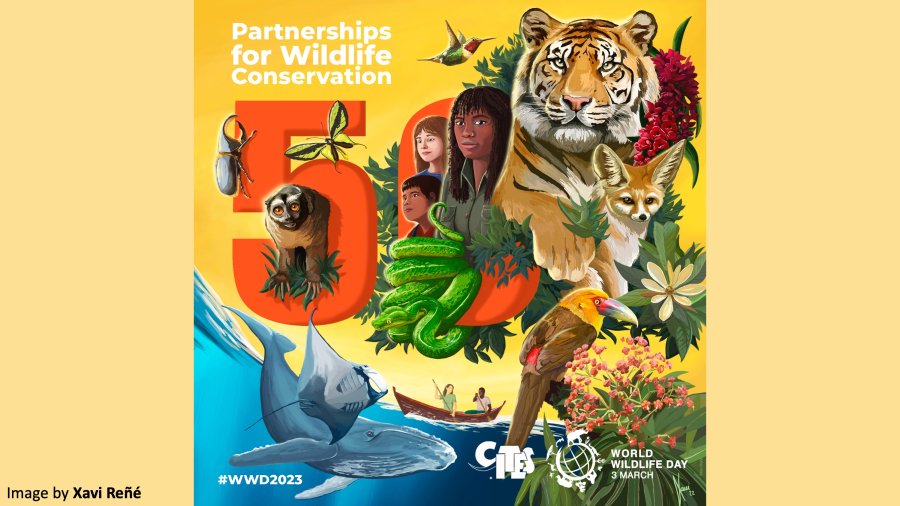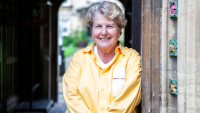
Join us to mark World Wildlife Day 2023 and the 50th anniversary of CITES (the Convention on International Trade in Endangered Species of Wild Fauna and Flora)
The World Wildlife Day theme this year is 'Partnerships for Wildlife Conservation'. Our WCSA Green Officer Shelia Ojwang and Wolfson student Deidre Boodoosingh have collaborated with the fantastic Operation Wallacea to bring you a talk, panel and Q&A on Wildlife Conservation, the successes, failures, perspectives and next steps we as a society and individuals can make. This will include a keynote speech from Dr Tim Coles, the founder and CEO of Operation Wallacea, on "Science-based ecological restoration for climate, people & biodiversity" followed by a panel discussion under the global theme “Partnerships for Wildlife Conservation”.
Image by Xavi Reñé
Details
Event programme
17.00 - Arrival, Refreshments, Meet and Greet
17:20 - Keynote Speech with Dr Tim Coles OBE (Founder and CEO of Operation Wallacea)
17:45 - Panel Discussion
- Nkamunu Patita (Co-Founder Earthacre Inc)
- Mira Margaretha (MPhil in Conservation Leadership)
- Bupe Banda (Program Manager at Resource Africa)
- Moderated by Dr Nigel Taylor (Conservation Science Group, University of Cambridge)
18:30 - Q&A and Closing remarks
World Wildlife Day 2023 acknowledges the significant contributions of individuals, local and intergovernmental organisations in sustainability, wildlife and biodiversity conservation and those these efforts have been enhanced by partnerships between organisations.
Keynote
"Science-based ecological restoration for climate, people & biodiversity": this keynote address will focus on how to fund conservation using private sector finance, through carbon and biodiversity credits, to protect biodiversity in some of the world's most threatened ecosystems, while maximising sustainable economic opportunities for local communities that rely on them. At the end of this talk, the keynote will then mention Operation Wallacea, showcasing its history and some landmark achievements, as well as briefly mentioning the opportunities to get involved through their international expeditions and UK field courses at the Knepp Estate.
Speaker: Dr Tim Coles OBE (Founder and CEO of Operation Wallacea)
Operation Wallacea (Opwall) provides a method for funding long term biodiversity research using tuition fees paid by students. Opwall has operated as a commercial business for 25 years and established reliable working partners in a series of countries around the world. It is these contacts including those at govt level that are being used to develop the potential mangrove reforestation projects for funding. Opwall has spent 25 years building small businesses in places such as Indonesia to deliver the research programmes they deliver. The Opwall teams have published over 560 papers in peer reviewed journals from their research programmes and have managed large scale projects overseas for the World Bank, Darwin Initiative and GEF. Tim also founded the Wallacea Trust that works on a series of conservation projects around the world based on the principle of incentivising individuals or local communities to achieve the desired conservation outcomes. Tim also led on the Wallacea Trust working group that developed an international biodiversity credit methodology.
Panel Discussion
Moderator: Dr Nigel Taylor (Conservation Science Group, University of Cambridge)
Dr Taylor is an ecological scientist, with a broad interest in ecology and conservation. He currently works with the Conservation Evidence team and the Centre for Landscape Regeneration at the University of Cambridge, synthesizing evidence to support landscape restoration in the UK and globally.
His other work includes: quantifying the behaviour, impacts and economic costs of invasive species; synthesizing evidence for the effects of interventions to conserve wetland vegetation; horizon scanning for conservation issues; and designing conservation strategies for crop wild relatives in the Czech Republic.
Panellist: Nkamunu Patita (Co-Founder Earthacre Inc)
I hold a Bachelors of Arts degree in Community Development from Daystar University. I have worked and volunteered in several organizations gaining experience in lobbying and advocacy, conservation policies, project management among others. I am affiliated to several organization such Kenya a Co- Founder of Earth Acre a Carbon Credit unit in the US partnering with indigenous peoples to create biodiversity credits and creating benefits for them, Kenya wildlife conservancies association, friends of national park. I have worked for The Wildlife Foundation, a Kenyan based NGO, working to develop incentives for communities in conservation with the goal of promoting coexistence and sustainability of community lands and wildlife habitat. I would like to help co create land trusts that will ensure protection of indigenous lands and pastoralism and sustain connectivity of ecosystems. I have a keen interest in developing incentives for benefit sharing and learning about investments in green economies, carbon credits markets to realize the value in natural capital in Africa.
Panellist: Mira Margaretha (MPhil in Conservation Leadership)
My journey as a wildlife conservationist began in 2012, shortly after I graduated from college. Armed with a bachelor’s degree in social psychology I landed my first role at the Frankfurt Zoological Society (FZS) Indonesia. Here I cooperated with poor rural communities in central Sumatra that were affected by conflict with elephants to help them shift to safe conflict mitigation methods. In this landscape I supported long-term change through dialoguing with the communities, governmental agencies, and the private sector while keeping critical goals such as loss reduction and human safety in mind. My work later focused on leading communication and environmental education programs at FZS and then later at the World Wildlife Fund (WWF) Indonesia in Southern Sumatra. In my latest role at the Wildlife Conservation Society (WCS), I manage a large conservation project in the Bukit Barisan Selatan National Park, a UNESCO World Heritage site in Sumatra. In this challenging role, I lead the collaboration between three NGOs to implement different aspects of the project including patrol and protection, biodiversity research, sustainable livelihoods, environmental and social safeguards, and community microfinance. I am interested in interdisciplinary approaches to finding solutions for the biodiversity crisis and to explore sustainable financing options.
Panellist: Bupe Banda Mhango (Program Manager at Resource Africa)
Bupe Banda Mhango is a young female conservation leader from Zambia. She studied Environmental education at the University of Zambia but has been practicing Community Based Natural Resource Management since 2015. Bupe has worked with the Zambian Department of National Parks and Wildlife, Frankfurt Zoological Society Zambia and the Zambian Community Resources Boards Association where she has been at the helm of coordinating communities into a strong national voice on natural resource management. Bupe also worked for Resource Africa as a programme manager and continues speaking on behalf of communities and supporting sustainable utilization of natural resources.
Throughout her work, Bupe's priorities have been around amplifying the voices of communities who live with and along wildlife and other natural resources, advocating for recognition and respect for their rights to access and benefit from management of these resources and inclusion of women and youth in conservation initiatives. Bupe is a member of the Community leaders Network of Southern Africa whose aim is to build on the National level community voices, amplifying at a regional and international level in all policy decision-making conservation conventions.
Bupe strongly believes that "for conservation to be meaningful, it has to be beneficial to all parties involved, and begin with those whose livelihoods depend on it".




